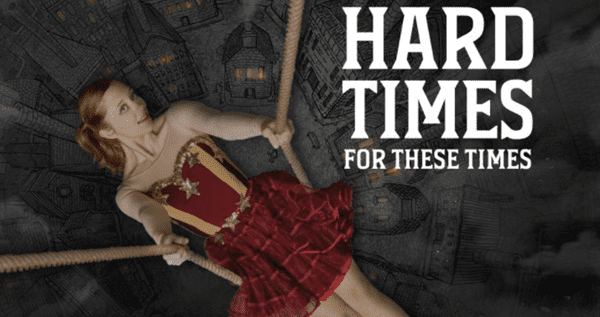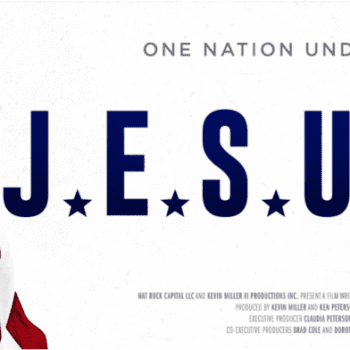 AstonRep Theatre Company is bringing an adaption of George Orwell’s prescient novel, 1984, to the Chicago stage and their timing couldn’t be more perfect. Our public discourse seems to have slid down the rabbit hole of “doublethink”, Orwell’s wonderful expression for deliberately forgetting what we know to be true so we can believe a lie. The line between fact and opinion has become so blurry that it has become fashionable to quote Senator Daniel Patrick Moynihan who said, “You are entitled to your own opinion, but you are not entitled to your own facts.” That something so obvious needs to be stated is disturbing, to say the least. But are we on the verge of an epidemic of doublethink as serious as that in 1984?
AstonRep Theatre Company is bringing an adaption of George Orwell’s prescient novel, 1984, to the Chicago stage and their timing couldn’t be more perfect. Our public discourse seems to have slid down the rabbit hole of “doublethink”, Orwell’s wonderful expression for deliberately forgetting what we know to be true so we can believe a lie. The line between fact and opinion has become so blurry that it has become fashionable to quote Senator Daniel Patrick Moynihan who said, “You are entitled to your own opinion, but you are not entitled to your own facts.” That something so obvious needs to be stated is disturbing, to say the least. But are we on the verge of an epidemic of doublethink as serious as that in 1984?
You’re Not the Boss of Me!
Here’s the situation facing the hero of the story, Winston Smith. Big Brother is the totalitarian ruler of Oceania. Citizens are coerced under the threat of torture and death to believe that everything Big Brother says is the whole truth and nothing but the truth. Lest anyone stray, the Thought Police monitors intonation, eye flutters and facial tics for signs of doubt. No one is free to act or think independently. To protect themselves they perfect the art of doublethink in order to actually believe in the lies. Because only perfect, unquestioning belief can guarantee their safety. Winston, because he harbors serious doubts about Big Brother’s veracity, lives in constant fear of being discovered, outed, killed, and the evidence of his existence erased from all historical records. Yikes!
Is our society and our political system anything like this? Can we detect discomfiting signs of a drift toward totalitarianism? The play will rightly provoke thoughtful audiences to debate this question. But there is a deeper question, one that shrinks the distance between ourselves and the citizens of Oceania in unsettling ways: Is our belief in our independence and autonomy itself an example of doublethink?
Shooting an Elephant
Just how autonomous are we? Orwell describes an incident that challenged his belief in his own independence in an essay from 1936 entitled, Shooting an Elephant. Here’s what happened.
While serving as a police officer of the British Empire in a small town in Burma (now Myanmar) in the 1920s, Orwell witnessed firsthand the brutal treatment of Burmese prisoners in British jails. He couldn’t help but come to view British imperialism as an evil force. But to the local people, he was the local representative of the hated British Empire. Locals routinely insulted and sneered at him, even Buddhist priests, who he says were “the worst of all”. He writes, “With one part of my mind I thought of the British Raj as an unbreakable tyranny… with another part I thought that the greatest joy in the world would be to drive a bayonet into a Buddhist priest’s guts.”
To believe the one part he must suppress the other, if only for that moment. An honest portrayal of how doublethink operates in our lives. Yet he did not doubt that he was his own man, acting and thinking independently. Then one day a rampaging elephant called his self-image into question.
The animal was rampaging through the bazaar and he was summoned to do something about it. It was a working elephant, otherwise tame, which Orwell surmised must be experiencing “must”, a periodic frenzy of violent behavior that afflicts male elephants. When he arrived at the scene, amid conflicting reports of where the elephant was, he was led to the body of a man who had been trampled to death only minutes before. With an elephant rifle and a large crowd in tow, he set off to find the elephant.
Now Orwell explains that he had no intentions of shooting the elephant unless in self-defense. But the crowd had taken on a carnival spirit. They wanted to see him shoot the elephant! Yet, when he found the elephant, it was calmly tearing and eating bunches of grass, “looking no more dangerous than a cow.” Orwell knew that the right thing to do would be to wait for the elephant’s owner to return and take him home. There was no need now to shoot the elephant, not even in self-defense, but he felt the expectations of the crowd of two thousand that had followed him. He writes:
Suddenly I realized that I should have to shoot the elephant after all… Here I was, the white man with his gun, standing in front of the unarmed native crowd – seemingly the leading actor of the piece; but in reality, I was only an absurd puppet pushed to and fro by the will of those yellow faces behind… A sahib has got to act like a sahib; he has got to appear resolute, to know his own mind and do definite things. To come all that way, rifle in hand, with two thousand people marching at my heels, and then to trail feebly away, having done nothing – no, that was impossible. The crowd would laugh at me. And my whole life, every white man’s life in the East was one long struggle not to be laughed at.
Orwell shoots the elephant. It is a brutal scene as he fires a barrage of bullets which fells the great animal but does not kill it. Unable to bear the elephant’s agony, Orwell walks away and learns afterwards that the elephant took thirty minutes to die.
The Price of Belonging
To prove he “knew his own mind” he followed the will of the crowd. Rather than lead the crowd to do what he knew was right, he was led by the crowd to do what he knew was wrong.
Orwell’s experience provides a window into the truth about our vaunted independence. We are each linked in subtle and unconscious ways to the opinions of others. Like Orwell who became a puppet of the crowd, the real and virtual “crowds” that we immerse ourselves in are constantly pulling our strings. We don’t need the Thought Police to monitor us because we monitor the reactions of those around us with scrupulous zeal for signs of approval or condemnation. Because above all else we want to belong and if sometimes the cost of belonging is the life of one crazy elephant, so be it.
This is no cause for shame. Our incredible openness to one another’s influence is what makes love possible. Who and what we love influences us so profoundly that we are shaped into new beings by our relationship with them. Big Brother contorts those who love him into fearful, obedient slaves. Orwell became an elephant killer because he loved the crowd’s opinion of him more than he loved his integrity. And sometimes we believe things that aren’t true because we love belonging to our social networks more than we love the truth. To deny that reality is to hide behind doublethink.
Sometimes the truth requires that we lower our gun and walk away from the crowd. Jeering and ridicule will surely come from those we considered our friends, but truth will also require that we suffer their approbation with equanimity and grace. What are you willing to suffer for the truth?
Suzanne Ross will lead a post-show discussion of AstonRep’s production of 1984 immediately following the 3:30 p.m. matinee on Sunday, September 24. Learn more.
Image: AtonRep Theatre poster for 1984.
Stay in the loop! Like Teaching Nonviolent Atonement on Facebook!











